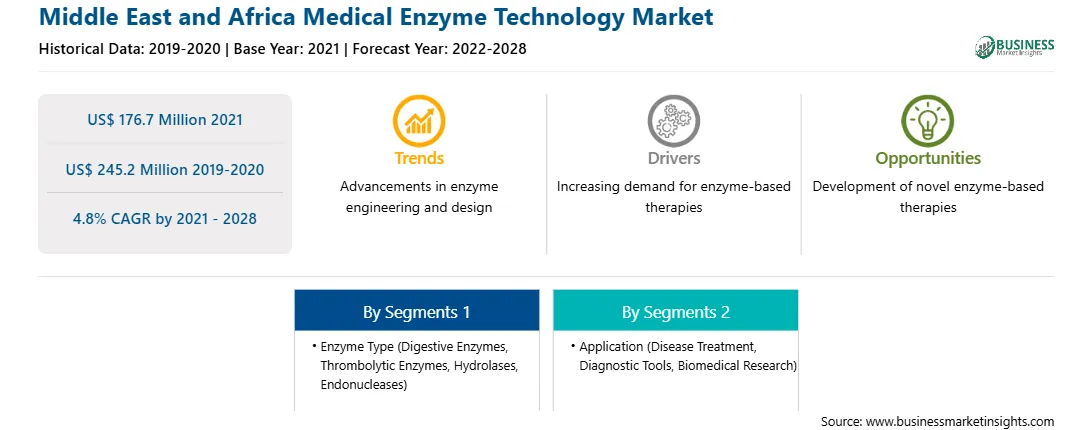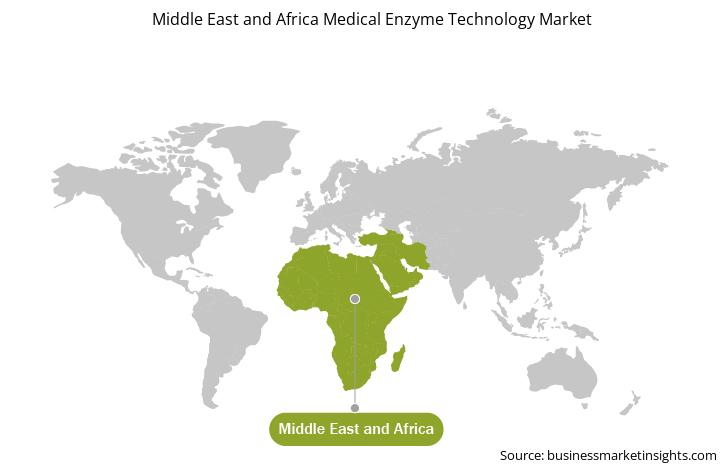Enzymes are proteins produced in living cells of plants, animals, and microorganisms. All living organisms require enzymes for growth and for the production and utilization of energy which is essential for life. In the living cell, enzymes act as catalysts to speed up the chemical reactions which control life processes. Enzymes have been significant industrial products for more than a hundred years. However, the range of potential applications is increasing rapidly. With the advent of recombinant DNA technology, it has become possible to make formerly rare enzymes in large quantities and hence to reduce cost. Also, in pharmaceutical manufacturing, the desire to make chirally pure compounds is leading to new opportunities. Technological advances have facilitated the use of enzymes over an increasingly broad range of process conditions.
Thus, the significant increase in research and development activities is expected to create a significant demand for medical enzyme technology in the coming years, which is further anticipated to drive the medical enzyme technology market.
Countries such as UAE, and Saudi Arabia have also registered a significant number of positive patients. These regions are developing in terms of the medical industry. The countries in these regions are highly dependent on medical devices and biopharmaceuticals products. Therefore, countries have faced several challenges for their requirements. Following COVID-19 and government actions, certain enzyme applications, such as pharmaceuticals and detergents, are likely to see an increase in demand. The increase in medical research and diagnostics has been a major factor in the increase in enzyme demand, as enzymes are widely used in medicine and pharmaceutical engineering. Some companies in the area are working with other businesses to consolidate all facilities under one roof for the convenience of the clients. DuBiotech, for example, is actively forming affiliations and partnerships with prestigious universities, specialist hospitals, global regulatory bodies, and other research parks to link the DuBiotech group with the global Life Sciences industry. DuBiotech includes a group of Biotechnology, Pharmaceutical, and Research firms, including global leaders such as Pfizer, Amgen, Merck Serono, and Genzyme, in keeping with its philosophy of being the major life science centre in the Middle East. Many small and medium-sized enterprises are also involved in the city. Such initiatives will help the gain traction for the medical enzyme’s technology market in near future.

Strategic insights for the Middle East and Africa Medical Enzyme Technology provides data-driven analysis of the industry landscape, including current trends, key players, and regional nuances. These insights offer actionable recommendations, enabling readers to differentiate themselves from competitors by identifying untapped segments or developing unique value propositions. Leveraging data analytics, these insights help industry players anticipate the market shifts, whether investors, manufacturers, or other stakeholders. A future-oriented perspective is essential, helping stakeholders anticipate market shifts and position themselves for long-term success in this dynamic region. Ultimately, effective strategic insights empower readers to make informed decisions that drive profitability and achieve their business objectives within the market.

| Report Attribute | Details |
|---|---|
| Market size in 2021 | US$ 176.7 Million |
| Market Size by 2028 | US$ 245.2 Million |
| Global CAGR (2021 - 2028) | 4.8% |
| Historical Data | 2019-2020 |
| Forecast period | 2022-2028 |
| Segments Covered |
By Enzyme Type
|
| Regions and Countries Covered | Middle East and Africa
|
| Market leaders and key company profiles |
The geographic scope of the Middle East and Africa Medical Enzyme Technology refers to the specific areas in which a business operates and competes. Understanding local distinctions, such as diverse consumer preferences (e.g., demand for specific plug types or battery backup durations), varying economic conditions, and regulatory environments, is crucial for tailoring strategies to specific markets. Businesses can expand their reach by identifying underserved areas or adapting their offerings to meet local demands. A clear market focus allows for more effective resource allocation, targeted marketing campaigns, and better positioning against local competitors, ultimately driving growth in those targeted areas.

The Medical enzyme technology market in Middle East and Africa is expected to grow from US$ 176.7 million in 2021 to US$ 245.2 million by 2028; it is estimated to grow at a CAGR of 4.8% from 2021 to 2028. Research and development activities are expected to set the tone for the future of the global medical enzyme technology market in the next few years. Over the past few years, researchers are increasingly focusing on enhancing the efficacy of drugs used to address obesity, cancer, and other treatments by deploying the medical enzyme technology. Also, a recent discovery of a new enzyme is expected to improve the drugs used to treat these conditions. In the past few years, several drugs that primarily focus on Histone deacetylases (HDACs) enzymes have gained considerable attention from drug developers and other stakeholders operating in the medical enzyme technology market due to their contribution in building resistance toward cancer treatments. As the research and development activities are increasing, the medical enzyme technology market is expected to witness a significant growth during the forecast period.
In terms of enzyme type, the hydrolases segment accounted for the largest share of the Middle East and Africa medical enzyme technology market in 2020. In terms of application, the disease treatment segment accounted for the largest share of the Middle East and Africa medical enzyme technology market in 2020.
A few major primary and secondary sources referred to for preparing this report on the medical enzyme technology market in Middle East and Africa are company websites, annual reports, financial reports, national government documents, and statistical database, among others. Major companies listed in the report are Merck Kgaa, Thermo Fisher Scientific Inc., Novozymes, Takeda Pharmaceutical Company Limited, Agilent Technologies, Inc., Genzyme Corporation, Asahi Kasei Corporation, Promega Corporation, Cytiva, and Amano Enzyme Inc.
By Enzyme Type
By Application
By Country
The Middle East and Africa Medical Enzyme Technology Market is valued at US$ 176.7 Million in 2021, it is projected to reach US$ 245.2 Million by 2028.
As per our report Middle East and Africa Medical Enzyme Technology Market, the market size is valued at US$ 176.7 Million in 2021, projecting it to reach US$ 245.2 Million by 2028. This translates to a CAGR of approximately 4.8% during the forecast period.
The Middle East and Africa Medical Enzyme Technology Market report typically cover these key segments-
The historic period, base year, and forecast period can vary slightly depending on the specific market research report. However, for the Middle East and Africa Medical Enzyme Technology Market report:
The Middle East and Africa Medical Enzyme Technology Market is populated by several key players, each contributing to its growth and innovation. Some of the major players include:
The Middle East and Africa Medical Enzyme Technology Market report is valuable for diverse stakeholders, including:
Essentially, anyone involved in or considering involvement in the Middle East and Africa Medical Enzyme Technology Market value chain can benefit from the information contained in a comprehensive market report.